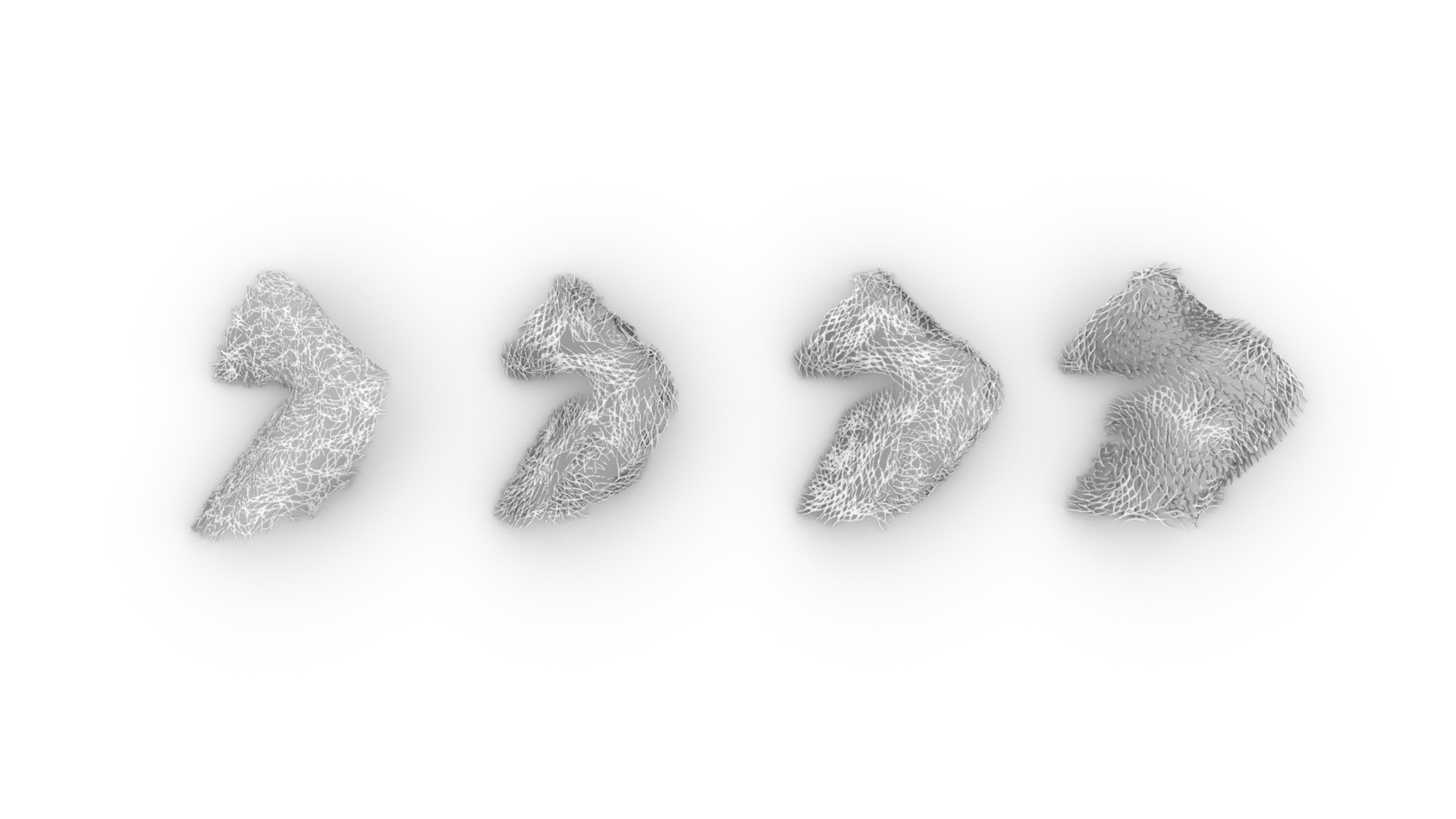Codes used in the Agent-based tectonics workshop held @ Design By Data 18-22 November 2019 - tutor: Alessio Erioli, Co-de-iT
Please note that this material is a compendium to the workshop, so many implied instructions, premises and cautions given during the dat-to-day development have not been included.
Tools used: Rhinoceros 3D v6 (includes Grasshopper), Visual Studio 2019.
Contains .gha asssemblies and .dll libraries and general purpose .gh definitions used in the workshop.
3Dpeople_20190923 - 3D people as meshes in 3 different resolutions
Util_Clipping plane - Turntable base.3dm
Util-01_clipping plane anim.gh
Util-02_turntable.gh
Util-03_record animation.gh
These files are helpers to generate, respectively: an animation of a moving clipping plane (for a model tomography), a turntable of one or more geometries, an animation of the agents from their trajectories as polylines
Util_post-processing-Dendro - template for isosurfacing line-base network geometries. Reading the Dendro plugin documentation is strongly suggested here
CurlNoise.gha - calculates Curl Noise for a point in x,y,z - useful to generate spatial vector field data
FileToScript2.gha - syncs the code of a C# or VB scripting component in Grasshopper with an external editor - this is an updated version for Rhino6 of FileToScript.gha, a tool written by Mateusz Zwierzycki wrapping up a code by Vicente Soler - additional code to update it for Rhino 6 by Daniel Fink, wrapped and recompiled as a .gha assembly by Alessio Erioli. Original discussion on FileToScript.
Noises.dll - library with Simplex and Curl Noise generation functions - see day 02/CS_02_functions.gh
SimplexNoise.dll - library with Simplex Noise generation functions, it can be used to embed Noise calculations in a custom C# script
Contains a bunch of customized Display Modes for Rhino 6 - they can be installed in Rhino from:
Tools > Options > View > Display Modes > Import
Rhino files and Grasshopper definitions for basic Mesh modeling (low poly to subdivision techniques)
These folders contain the daily progress of the course. When present, the in class folder contains the WIP files developed that day
01-00_iterative strategies - intuition.gh - introduction to iterative strategies in Grasshopper - intuitive approach (standard compopnents + Anemone plug-in)
01-01_environment and field - intuition.gh - reading information from an environment/field - intuitive approach
01-02_boundary behaviors intuition.gh - simple boundary behavior - intuitive approach
01-03_environment and field - wrap - intuition.gh - boundary wrap behavior - intuitive approach
CS_00_intro.gh - introduction to C# programming in Grasshopper
CS_01_data 01.gh - data types in C# - part 1
CS_01_data 02.gh - data types in C# - part 2 - loops and conditional statements
02-00_stigmergy - basic - intuition.gh - reading and writing information in an environment - intuitive approach
CS_02_functions.gh - functions in C#
CS_03_classes.gh - classes and objects in C#
CS_04_gradient descent.gh - gradient descent example in C#
CS_05_delegates example.gh - explanation of delegates, anonymous functions and lambda syntax in C#
CS_06_RTree point search.gh - using RTree data structure in C# - simple example of nearest neighbours search
Visual Studio project folder for the basic Agent System setup
AgentSystem.gh - a flocking agent system based on Craig Reynolds classical rules
Mesh Base treatment.gh + 3dm - files to build vertex-colored meshes for scalar and vector data fields, to use with the Agent_Bodies workflow.
Post-Processing_Dendro.gh - file for isosurfacing line-base network geometries. Reading the Dendro plugin documentation is strongly suggested here. Since there was little to no time to show it during the seminar, I have prepared a 30 min definition walkthrough here. Please watch the video before using the definition.
Visual Studio project folder for the Agent Bodies strategies (for the assigment).
Agent_Bodies.gh - the final version of the Agent System with bodies - agents are populating a mesh surface, read scalar and vector data and have simple polyline bodies whose limbs search connection with the neighbours and their global formation results in a performative ornamentation
